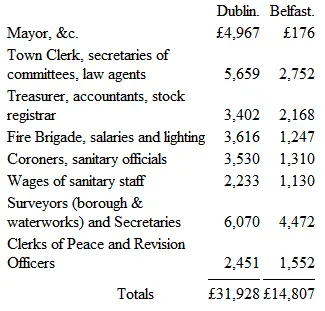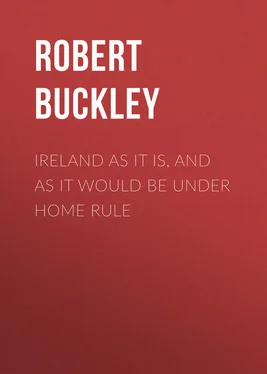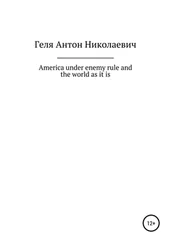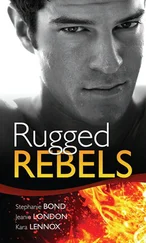Robert Buckley - Ireland as It Is, and as It Would Be Under Home Rule
Здесь есть возможность читать онлайн «Robert Buckley - Ireland as It Is, and as It Would Be Under Home Rule» — ознакомительный отрывок электронной книги совершенно бесплатно, а после прочтения отрывка купить полную версию. В некоторых случаях можно слушать аудио, скачать через торрент в формате fb2 и присутствует краткое содержание. ISBN: , Жанр: foreign_antique, foreign_prose, на английском языке. Описание произведения, (предисловие) а так же отзывы посетителей доступны на портале библиотеки ЛибКат.
- Название:Ireland as It Is, and as It Would Be Under Home Rule
- Автор:
- Жанр:
- Год:неизвестен
- ISBN:http://www.gutenberg.org/ebooks/29710
- Рейтинг книги:5 / 5. Голосов: 1
-
Избранное:Добавить в избранное
- Отзывы:
-
Ваша оценка:
- 100
- 1
- 2
- 3
- 4
- 5
Ireland as It Is, and as It Would Be Under Home Rule: краткое содержание, описание и аннотация
Предлагаем к чтению аннотацию, описание, краткое содержание или предисловие (зависит от того, что написал сам автор книги «Ireland as It Is, and as It Would Be Under Home Rule»). Если вы не нашли необходимую информацию о книге — напишите в комментариях, мы постараемся отыскать её.
Ireland as It Is, and as It Would Be Under Home Rule — читать онлайн ознакомительный отрывок
Ниже представлен текст книги, разбитый по страницам. Система сохранения места последней прочитанной страницы, позволяет с удобством читать онлайн бесплатно книгу «Ireland as It Is, and as It Would Be Under Home Rule», без необходимости каждый раз заново искать на чём Вы остановились. Поставьте закладку, и сможете в любой момент перейти на страницу, на которой закончили чтение.
Интервал:
Закладка:
There is no lack of enthusiasm here, but the people mind their work, and do not bubble over every five minutes. They certainly showed warmth on Monday morning, and never was popular ruler, victorious general, or famous statesman welcomed with more spontaneous burst of popular acclaim. York Street was literally full of all classes of people, save and except the typical Irish poor. Of the tens of thousands who filled Royal Avenue, Donegal Place, and the broad road to the North Counties Railway, I saw none poorly clad. All were well dressed, orderly, respectable, and wonderfully good-humoured, besides being the tallest and best-grown people I have ever seen in a fairly extensive European experience. I was admitted to the station with a little knot, comprising the Marquess of Ormonde, Lord Londonderry, the gigantic Dr. Kane, head of the Ulster Orangemen, and Colonel Saunderson, full as ever of fun and fight. It was at first intended to keep the people outside, and a strong detachment of police guarded the great gates, but in vain. They were swept away by mere pressure, and the people occupied the place to the number of many thousands, mostly wearing primroses. As the train steamed in there was a tremendous rush and cheering – genuine British cheering, such as that with which Birmingham used on great occasions to greet John Bright – rendering almost inaudible the numerous explosions of fog-signals which perhaps by way of salute had been placed at the entrance to the station. There was a mocking shout of "Dynamite," followed by a roar of laughter, and despite the frantic efforts of the railway men, who humanely struggled to avoid the seemingly impending sacrifices à la Juggernaut, the more active members of the crowd storming the train, instantly sprang aloft and manned the tops of the carriages with a solid mass of vociferating humanity. Soon Mr. Balfour's face appeared, and a moment after he was standing amidst the throng, swayed hither and thither by loyalists who shook his hands, patted him on the back, deafened him with their cheers. Out came the horses, dashing through the people, snorting and plunging like so many Gladstonians, but happily injuring no one. In went the men, Mr. Balfour laughing merrily, and looking uncommonly fit, lifting his soft brown hat in mute recognition of the magnificent welcome accorded by men who are perhaps among the most competent judges of his merit as a benefactor of Ireland. Away went the carriage, amid tumultuous shouting of "No Home Rule," and "God save the Queen." This went on for miles, from the Northern Counties' Terminus to Victoria Street, when Lord Londonderry signalled to quicken the pace, and after a short speech at the Albert Memorial, the cortége disappeared over the bridge, and I returned to meet the English working men who arrived an hour later. Splendid it was to hear the six hundred miners from Newcastle-on-Tyne shouting "Old Ireland for ever!" while the generous Irishmen responded with "Rule Britannia" and cheers for Old England. Cheers for Belfast and Newcastle alternated with such stentorian vigour, each side shouting for the other, that you might have been excused for imagining that the Union of Hearts was an accomplished fact, and that brotherly love had begun and must ever continue. Said a miner, "We're all surprised to see that the people here are just like Englishmen. An' I'm blest if they aren't more loyal than the English themselves."
From Monday morning the city has been resounding with beat of drum and the shrill sounds of the fife. The houses are swathed in bunting, and the public buildings were already covered with banners when I arrived on Friday last. This, however is not characteristic Belfast form. The Belfasters can rejoice, and whatever they do, is thoroughly done, but work is their vocation, as befits their grave and sober mood. They are great at figures, and by them they try to show that they, and not the Dubliners, should be first considered. They are practical, and although not without sentiment, avoid all useless manifestation of mere feeling. They are mainly utilitarian, and prefer mathematical proof, on which they themselves propose to rely, in proving their case. Here is an instance. A Belfast accountant, who is also a public officer, has collected a number of comparative figures on which he bases the claims of Belfast to prior consideration. The figures are certainly exact, and are submitted as evidence of the superior business management, and larger, keener capacity of Protestant Belfast as compared with those of Catholic Dublin. Beginning with the functions of the Dublin Lord Mayor, secretary, and so forth, which cost £4,967 a year, it is shown that the same work in Belfast – which is rather larger than Dublin – costs only £176. Let us tabulate a few representative cases: —

This discrepancy is everywhere observable. The Dublin Gas Management costs £14,850 against £8,060 in Belfast, with the result that the Ulster City Gasworks yielded in 1891 a profit of £27,105, charging 2s. 9d., while the Dubliners charge 3s. 6d. and make no profit at all. The Belfast markets yield a profit of about £3,500, while on the Dublin markets and abattoir there was a deficit of £3,012 to be made good by the ratepayers. Dublin, with property amounting to £20,000 a year and old-established Royal bounties, owes nearly twice as much as Belfast, which latter city spends more on what may be called the advance of civilisation. In 1892 Belfast spent £8,000 on a public park – Government providing for this matter in Dublin – £5,686 on public libraries, and £4,100 on baths and workhouses, against £1,217 and £1,627 for like purposes in Dublin. "Therefore," say the Belfast men, "we will not have our affairs managed by these incompetent men, who, besides their demonstrated incapacity to deal with finance, are dependent for their position on the illiterates of the agricultural districts, who are to a man under the thumb of the priests, and who, moreover, have shown that their rapacity is equal to their lack of integrity, and whose leading doctrine is the repudiation of lawful contracts," a point on which commercial Ulster is excessively severe. One thing is certain – Ulster will never pay taxes levied by an Irish Legislature in which Ulster would be utterly swamped. All classes are of this opinion, from the Earl of Ranfurly, who during a long interview repeatedly expressed his conviction that the passing of any Home Rule Bill would be fraught with most lamentable results, to the humble trimmer of a suburban hedge who, having admitted that he was from the county Roscommon, and (therefore) a Catholic Home Ruler, claimed to know the Ulster temper in virtue of 28 years' residence in or near Belfast, and said —
"What they say they mane, an' the divil himself wouldn't tur-r-n thim. Ah, but they're a har-r-d-timpered breed, ivery mother's son o' them. Ye can comether (gammon) a Roscommon man, but a Bilfast man, whillaloo!" He stopped in sheer despair of finding words to express the futility of attempting to take in a Belfast man. "An' whin ye ax thim for taxes, an' they say they won't pay – ye might jist as well whistle jigs to a milestone! 'Tis thrue what I tell ye."
As for to-day, the magnificence of the pageant beggars description. Whether regarded from a scenic point of view or with respect to numbers and enthusiasm, never since Belfast was Belfast has the city looked upon a sight approaching it. From early morning brass bands and fife bands commenced to enter the city from every point of the compass, and wherever you turned the air resounded with the inspiring rattle of the drum. Monday's display of bunting was sufficiently lavish to suggest the impossibility of exhibiting any more, but the Belfasters accomplished the feat, and the bright sunshine on the brilliant colours of the myriad banners was strongly reminiscent of Paris en fête under the Empire. The Belfast streets are long, straight, and wide, and mostly intersect at right angles. Much of the concourse was thus visible from any moderate coign of vantage, and from the Grand Stand in Donegal Place the sight was truly wonderful. The vast space, right, left, and front, was from 10 o'clock closely packed with a mighty multitude that no man could number, and locomotion became every moment so painful as to threaten total stagnation. The crowd was eminently respectable and perfectly orderly, and submitted to the passage of innumerable musical organisations with charming good humour. Never have I seen or heard of such an assemblage of bands, all uniformed, all preceded by gorgeous banners bearing all kinds of loyal and party mottoes, all marching in splendid military fashion, and of themselves numerous enough to furnish a very considerable demonstration. Many of the tunes were of a decidedly martial character, and strange to English ears, such as the "Boyne Water," the "Orange Lily" and the "Protestant Boys," the last being a version of the "Lillibulero" so often mentioned by Scott. All these tunes, more or less distasteful to Nationalists, were interspersed with others less debatable, such as "Rule Britannia," "The Old Folks at Home," "The Last Rose of Summer," "God Save the Queen," and "See the Conquering Hero comes," which last generally accompanied the portrait of Orange William, the "Glorious, Pious, and Immortal," mounted on his famous white charger, which noble animal is depicted in the attitude erroneously believed to be peculiar to that of Bonaparte when crossing the Alps. The Earl of Beaconsfield was also to the fore with primroses galore; indeed, the favourite flower was invariably worn by the ladies, who were greatly in evidence. "Our God, our Country, and our Empire" was the motto over Mr. Balfour, with a huge "Welcome" in white on scarlet ground, the whole surrounded by immense Union Jacks. The familiar red, white, and blue bore the brunt of the decorative responsibilities, although here and there the green flag of Ireland hung cheek by jowl with the English standard, emphasising the friendliness of the present Union. As time went on the crowd became more and more dense, and a breathless pressman, who reached his post at twelve o'clock, stated that the seething myriads of Donegal Place and the adjacent streets were "hardly a circumstance" to what he had seen in the York Road, where the people awaited the hero of the hour. Things were getting serious at 12.15, and then it was that the active members of the crowd swarmed on the railings, balancing themselves in most uncomfortable situations, and maintaining their spiky seats with a tenacious martyrdom which spoke volumes for the determination of the Ulster character.
Читать дальшеИнтервал:
Закладка:
Похожие книги на «Ireland as It Is, and as It Would Be Under Home Rule»
Представляем Вашему вниманию похожие книги на «Ireland as It Is, and as It Would Be Under Home Rule» списком для выбора. Мы отобрали схожую по названию и смыслу литературу в надежде предоставить читателям больше вариантов отыскать новые, интересные, ещё непрочитанные произведения.
Обсуждение, отзывы о книге «Ireland as It Is, and as It Would Be Under Home Rule» и просто собственные мнения читателей. Оставьте ваши комментарии, напишите, что Вы думаете о произведении, его смысле или главных героях. Укажите что конкретно понравилось, а что нет, и почему Вы так считаете.












